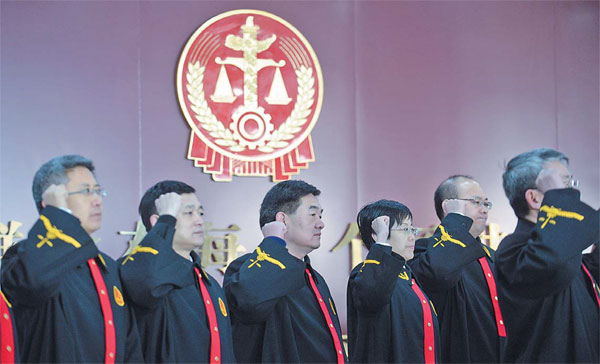Strong case for judicial reform at China's two sessions
Top court: Transparency will improve national and individual security
Chinese courts are determined to fight crimes that seriously damage the security of the country and its people, as well as further improve judicial reforms this year, China's top court vowed during the annual session of the nation's top legislature.
 |
|
Judges from the Second Circuit Court of China's Supreme People's Court take their oaths of office. The court was established on Jan 31 in Shenyang, capital of Liaoning province. The new circuit courts are part of a series of reforms designed to better deal with the workloads of courts across the country. Mu Ying / China Daily |
Chinese courts filed 15.65 million cases last year and concluded 13.98 million of them, a rise of 10 percent and 6.6 percent, respectively, from 2013, according to the Supreme People's Court.
Of the concluded cases, about 60 percent were civil and commercial cases, while 8.3 percent were criminal ones, said the top court's report, issued in the third session of the 12th National People's Congress, which took place from March 5 to 15.
Reinforcing the central government's position against terrorism, the courts ruled on 558 cases of inciting terror in 2014, a year-on-year increase of 14.8 percent, the report said.
Meanwhile, 712 defendants in these terrorism-related cases were punished, a 13.3 percent rise year-on-year, the report adding that the courts will continue to deal with such crimes strictly in 2015.
For some other serious criminal cases, including gang-related offenses, robberies and murders, Zhou Qiang, the top court's president, said all courts will hear them carefully and hand down severe punishments for offenders.
When sentencing those who damaged society and others, every court also provided enough legal protections for victims of the offenses, especially women and children, Zhou said.
In 2014, 1,048 cases relating to human trafficking and sexual assault were heard and concluded in courts, the report said, with 876 convicts sentenced to at least five years.
"We're also developing research and soliciting opinions in a move to make our country's judicial guidelines against domestic violence in a timely manner," Zhou said, adding the making of legal documents is an important part of judicial reforms.
Chinese leadership raised the matter of judicial reforms in the Third Plenary Session of the 18th CPC Central Committee in October 2013. Since then, a series of projects and measures to push forward and fulfill the reforms have been launched.
In the earliest stage, the top court required courts at all levels to put verdicts on the Internet in November 2013, to urge judges to make judgments carefully and give a clearer interpretation of the documents.
The move is the first step to make judicial work transparent across the country. Many trials have been broadcast on courts' microblogs and websites, and litigants can find out about their cases online or through a smartphone application.
By February, more than 6.29 million verdicts had been disclosed online, including 7,993 from the top court, according to the report.
To ensure every verdict was enforced, the top court posted information of those who refused to comply with judgments via another online platform, also established in 2013.
"We uncovered 1.1 million people who did not accept their verdicts," Zhou said. "People on the website are restricted from taking flights and trains, as well as using credit cards."
Since 2014, the pace to push through judicial reforms has been accelerated.
To make trials more professional, the country set up tribunals to hear intellectual property disputes in Shanghai, Beijing and Guangdong province.
On Nov 2, Jiang Ying, an IP judge, came to Beijing IP Court from the capital's No 1 Intermediate People's Court, and four days later the IP court was formally open to the public.
Although 47-year-old Jiang was happy in her old job, she couldn't resist the opportunity to work at the IP court, a pilot program to accesses the impact of the judicial reforms.
"The IP court is aimed at developing new ways of hearing IP-related cases and to explore other areas that may benefit from reform," she said.
The IP court is testing proposed national guidelines that will affect the way judges are allocated and that will allow them to reach verdicts without the need to review every case with senior colleagues, she said.
The reforms propose that the nation's judicial officers should be split into three groups: some 30 percent will become judges and prosecutors, about 50 percent will be classified as legal assistants, and the rest will oversee administration.
"That's to say, it'll be harder to become a judge, and we expect to see an obvious decline in their numbers to publicly indicate that the nation's judicial system is being streamlined to improve efficiency," she said.
The IP court currently employs 25 judges, including three court presidents. As the reform is rolled out nationwide, a number of younger judges may be legal assistants, although a timetable has yet to be finalized.
"Some younger ones have left or are ready to quit their post when they hear the new allocation, because the assistant's salary and benefits may be lower than before," she said, confirming she is aware of complaints from other courts.
"Young people fear their roles will change and they will be prevented from hearing cases," she said, but adding that few of her young colleagues agree with critics.
"Some younger judges in the IP court, including those who have worked less than five years, are quite keen to become an assistant, as they realize they still have a great deal to learn," she said.
Moreover, judges who work in the court are experts in IP disputes and they are worried they will no longer be allowed to hear them if they are moved elsewhere or their roles are changed in old courts, "which is why they came to the new IP court and were willing to be assistants," she said.
The judge also approved the reform of making verdicts independently. "Now, a case hearing or judgment cannot be interfered with by a court's presidents. It means the trial must be tackled only by the case judge and if others disagree with verdicts, clerks of the case must note down their opinions and show them in the court."
However, she added that a number of problems may affect court efficiency, such as a lack of clarity about the roles and responsibilities of the assistants.
"Some people have said the assistants will take charge of doing research and dealing with people who want to disturb case hearings, but so far, no specific role has been stated in the reforms," she added.
Also in November, courts to hear disputes over administrative regions were established in Beijing and Shanghai, in a move to keep regional governments from interfering with cases.
In addition, two circuit courts of the top court became operational in Shenzhen, Guangdong province, and Shenyang, Liaoning province, in January.
Residents living close to the circuit courts can file lawsuits and ask for legal aid in the two provinces instead of going to Beijing, which reduces litigants' travel costs and provides them with convenient legal support.
However, a judge in Beijing, who preferred not to be named, said a few problems, including dealing with petitioners, still exist under the reforms extra-legal work. He said he was disappointed when the top court issued an updated guideline on the reform on Feb 26, as the criteria under which judges will be selected is still not clear.
"Also, some provinces are taking measures to just cater to the reforms instead of doing something really useful to our country's judicial system," he said.
Tian He, a judicial researcher at the Institute of Law at the Chinese Academy of Social Sciences, says the pilot program of the reforms, which do not have a specified timeline, should continue for as long as it takes to garner sufficient information.
The reforms will only be enforced effectively and gain general acceptance if the problems are identified and rectified quickly, she says.
Under the amended guidelines, the top court said the aim of the reforms is to set up a system of trial firmly rooted in Chinese culture by 2018.



